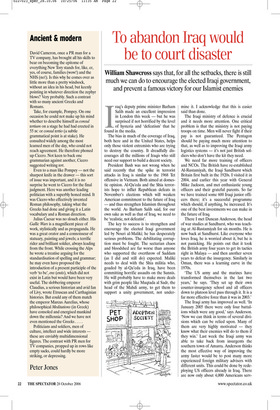To abandon Iraq would be to court disaster
William Shawcross says that, for all the setbacks, there is still much we can do to encourage the elected Iraqi government, and prevent a famous victory for our Islamist enemies Iraq’s deputy prime minister Barham Salih made an excellent impression in London this week — but he was surprised if not horrified by the level of hysteria and ‘defeatism’ that he found in the media.
The bias in much of the coverage of Iraq, both here and in the United States, helps only those violent extremists who are trying to destroy the country. It dreadfully discourages all the millions of Iraqis who still need our support to build a decent society.
President Bush was not wrong when he said recently that the spike in terrorist attacks in Iraq is similar to the 1968 Tet offensive in Vietnam. Both aimed at domestic opinion. Al-Qa’eda and the Shia terrorists hope to inflict Republican defeats in November’s elections which will weaken American commitment to the future of Iraq — and thus strengthen Islamism throughout the world. As Barham Salih said, for our own sake as well as that of Iraq, we need to be ‘realistic, not defeatist’.
The key to success is to strengthen and encourage the elected Iraqi government led by Nouri al-Maliki; he has desperately serious problems. The debilitating corruption must be fought. The sectarian chaos and bloodshed are far worse than anyone who supported the overthrow of Saddam (as I did and still do) expected. Maliki needs to deal with the Shia militia who, goaded by al-Qa’eda in Iraq, have been committing horrific assaults on the Sunnis. He will probably have to make more deals with grim people like Muqtada al Sadr, the head of the Mahdi army, to get them to support a unity government, not under mine it. I acknowledge that this is easier said than done.
The Iraqi ministry of defence is crucial and it needs more attention. One critical problem is that the ministry is not paying troops on time. Men will never fight if their pay is not guaranteed. The Pentagon should be paying much more attention to that, as well as to improving the Iraqi army logistics systems — it’s not just British soldiers who don’t have the kit they need.
We need far more training of officers and NCOs. The British have re-established Al-Rustamiyah, the Iraqi Sandhurst which Britain first built in the 1920s. I visited it in 2004, and earlier this year with General Mike Jackson, and met enthusiastic young officers and their grateful parents. So far we have trained some 600 Iraqi junior officers there; it’s a successful programme which should, if anything, be increased. It’s one of the best investments we can make in the future of Iraq.
There I met Duncan Anderson, the head of war studies at Sandhurst, who was teaching at Al-Rustamiyah for six months. He is now back at Sandhurst. Like everyone who loves Iraq, he is worried about it, but he is not panicking. He points out that it took the British army four years to get its tactics right in Malaya — and then another seven years to defeat the insurgency. Similarly in Oman, there was a learning curve in the 1970s.
‘The US army and the marines have transformed themselves in the last two years,’ he says. ‘They set up their own counter-insurgency school and all officers down to platoon level pass through it. It is a far more effective force than it was in 2003.’ The Iraqi army has improved as well. ‘In January 2005 there were only four battalions which were any good,’ says Anderson. ‘Now we can think in terms of several divisions which can be relied upon. Many of them are very highly motivated — they know what their enemies will do to them if they win.’ Last week the Iraqi army was able to take back from insurgents the southern town of Amarra. Anderson thinks the most effective way of improving the army faster would be to post many more experienced foreign military advisers with different units. This could be done by redeploying US officers already in Iraq. There are now only about 4,000 Americans serv ing with Iraqis. Double that and increase the British input and we would see not just an improvement in the technical competence but also in the morale of Iraqi forces.
Armchair pundits in the West like to blame the crisis in Iraq on mistakes made in Washington, particularly by Donald Rumsfeld. There have certainly been such mistakes, but whether the present situation would have been markedly different without them can never be known.
Moreover, our mistakes were tactical not moral; our soldiers have not died plundering or colonising Iraq — they have died trying to help Iraqis make it better. The blame for the present chaos lies, above all, with the monstrous al-Qa’eda and Baathist Sunni terrorists and the equally vile Shia militia, who are abetted by Iran. The vast majority of deaths in Iraq are being inflicted by Muslims on other Muslims, for reasons which have little to do with us.
There are those who claim we could make a deal with Iran and its client Syria in a compromise settlement of Iraq’s problems. It’s hard to envisage. Both governments have done everything possible to destroy the new Iraq. The Syrian government has enabled the Damascus Baathist mafia to smuggle thousands of suicide bombers into Iraq. Our bomb disposal experts can often identify the precise Tehran factories in which car bombs and other deadly explosive devices have been manufactured. Iran is now stoking the violence by warning that it could do even worse if it gets its way with its nuclear ambitions. This week the Iranian president made his most chilling threat yet against European support for Israel, warning that Europe could get hurt if ‘a storm begins’ over Palestine. ‘It is in your own interest to distance yourself from these criminals [Israel]. This is an ultimatum.’ Kanan Makiya, the great Iraqi historian, acknowledges we have made mistakes in Iraq, but he still believes that it was right ‘to get rid of what was an exceptional tyranny, even by the terrible standards of the Middle East’. He says, ‘As an Iraqi, I cannot ever say it was wrong to support the overthrow of that dictatorship. And I challenge any human being to say to me that it was wrong.’ Tony Blair and George Bush are absolutely right to insist that we cannot abandon Iraq. We are there under a United Nations mandate (soon up for renewal), assisting the legitimate, elected government. We should hand over to the Iraqis as they become more capable, but a premature pullout would condemn Iraq and the region to unbelievable horror. And it would be a famous victory for our Islamist enemies, who declared war on us long before we went into Iraq. If we allow ourselves and the overwhelming majority of Iraqis to be defeated, that defeat will be only the first of very many — in the region and the world. The Islamists will give no quarter.



























































































 Previous page
Previous page